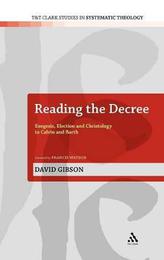
|
Reading the Decree: Exegesis, Election and Christology in Calvin and Barth
Hardback
Main Details
| Title |
Reading the Decree: Exegesis, Election and Christology in Calvin and Barth
|
| Authors and Contributors |
By (author) David Gibson
|
| Series | T&T Clark Studies in Systematic Theology |
|---|
| Physical Properties |
| Format:Hardback | | Pages:240 | | Dimensions(mm): Height 234,Width 156 |
|
| Category/Genre | Christian theology |
|---|
| ISBN/Barcode |
9780567468741
|
| Classifications | Dewey:230.42 |
|---|
| Audience | | Professional & Vocational | |
|---|
|
Publishing Details |
| Publisher |
Bloomsbury Publishing PLC
|
| Imprint |
T.& T.Clark Ltd
|
| Publication Date |
17 September 2009 |
| Publication Country |
United Kingdom
|
Description
What role does the interpretation of Scripture play in theological construction? In Reading the Decree David Gibson examines the exegesis of election in John Calvin and Karl Barth, and considers the relationship between election and Christology in their thought. He argues that for both Calvin and Barth their doctrine of election and its exegetical moorings are christologically shaped, but in significantly different ways. Building on Richard A. Muller's conceptual distinction between Calvin's soteriological christocentrism and Barth's principial christocentrism, Gibson carefully explores their exegesis of the topics of Christ and election, and the election of Israel and the church. This distinction is then further developed by showing how it has a corresponding hermeneutical form: extensive christocentrism (Calvin) and intensive christocentrism (Barth). By focussing on the reception of biblical texts Reading the Decree draws attention to the neglected exegetical foundations of Calvin's doctrine of election, and makes a fresh contribution to current debates over election in Barth's thought. The result is a study which will be of interest to biblical scholars, as well as historical and systematic theologians alike.
Author Biography
David Gibson is Assistant Minister at High Church Hilton, Aberdeen. He studied theology at Nottingham University and King's College London, and completed a doctorate at the University of Aberdeen.
Reviews'There is much to commend about Gibson's study. He offers the reader a clear, careful and fair reading of Calvin and Barth... He is refreshingly appreciative of the ways in which the connections and motifs internal to Barth's own thought are deeply indebted to the Reform tradition, and particularly to Calvin... this study deserves a wide reading, and will be of particular interest to Calvin and Barth scholars.' -- Jounral of Theological Studies This rewarding study is a model of theology which is systematic in the best sense: it perceptively illumines the coherence of doctrine, and it does so through analysis of two towering figures in the Reformed tradition. Its most valuable contribution, however, is the care with which it examines the exegetical decisions which attend these doctrinal formulations. -- Journal of Reformed Theology 4 'Dr Gibson's exploration of the complex of issues that arises in the theological intersection of Christology, election and Scripture in Calvin and Barth is deft and clear, and painstaking and fair. The way in which he approaches his task, by fashioning illuminating methodological tools to interrogate the two theologians, is very well done. The result is a fascinating and valuable study.' - Paul Helm, Regents College, Vancouver, Canada -- Paul Helm 'Debates about the future of Reformed theology often tend to focus on the nature of the legacy of two men in particular: John Calvin and Karl Barth. Much ink has been spilled in examining the theological, social, intellectual, cultural, and even psychological backgrounds of these two men as a means of establishing their respective significance; but, in this work, David Gibson addresses these matters via a close study of their exegesis as a means of establishing just how faithful each was to their own stated scripture principle. Gibson's work represents a constructive and insightful development of contemporary discussion of the nature of Reformed theology.' - Carl R. Trueman, Westminster Theological Seminary, Philadelphia, USA -- Carl R. Trueman 'For those who deplore the "dumbing down" of so much Christian publishing nowadays, this volume will offer a refreshing change' Churchman, Sept. 2010
|